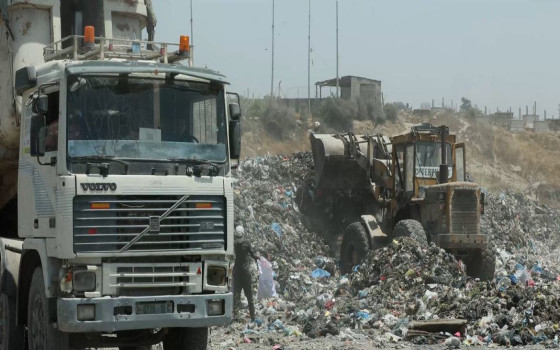
Gaza - Major health and environmental problems caused by waste, and UN efforts to remove it and find solutions

- Europe and Arabs
- Monday , 9 June 2025 10:0 AM GMT
Gaza: Europe and the Arabs
"There is nothing worse than being next to piles of garbage," is how Palestinian refugee Jamil Abu Amsha described the problem of piles of garbage piling up in Gaza City, which "causes major health and environmental problems" and is a "terrible health hazard."
Jamil spoke to a UN News correspondent in Gaza while standing near the tents of displaced people in the Tel al-Hawa neighborhood of Gaza City. Scenes of piles of garbage and waste are clearly visible, where flies, mosquitoes, and foul odors are rampant, Jamil explained. "Diseases infect our children and are transmitted to us. We cannot sit here."
This "bad situation" is also being experienced by Abeer Abu Harbid, a Palestinian refugee from the town of Beit Hanoun in the northern Gaza Strip. She told UN News: "The garbage has affected us in every way, whether from the strange mosquitoes whose bites leave marks on our faces, or from the smell, which we absolutely cannot stand. We cannot walk here because of the disgusting sight." Palestinian refugee Subhi al-Kafarna said, "Life has become unbearable." He added, "The waste has affected people, both in terms of the foul odors and the lack of sleep. Children have become sick."
In front of these piles of garbage, bulldozers accompanied by trucks work to clear the area and move the piles away from residents and displaced people. These vehicles and the workers accompanying them belong to the United Nations Development Fund, which is working on various projects to mitigate the effects of the waste crisis and the garbage spread throughout the streets and camps throughout the Strip.
"Behind me is a huge mountain of waste that has accumulated since the beginning of the war," said Alessandro Maracchi, Director of the UNDP office in Gaza, standing in front of one of the piles of garbage. "At first, it was a very small area for waste collection, but now it's over seven meters high, and we currently have about 200,000 cubic meters of waste here. This is unacceptable for the city, the families, the children, and the shops. It has become a health priority, especially with summer approaching." The UN official confirmed that they are working to find solutions to this problem, adding: "We are ready, in cooperation with contractors, to transfer the waste, and we are just waiting for the green light to transfer it to a temporary alternative site near Gaza City, as we currently cannot access the two main landfills. This is our top priority at the moment." He explained that the program is coordinating with the Infrastructure Working Group and leading the work on solid waste management in cooperation with several partners. He also confirmed that they are working in the southern Gaza Strip, in cooperation with UNICEF, the United Nations Relief and Works Agency for Palestine Refugees (UNRWA), and other key partners, to ensure that waste is collected from the streets and disposed of properly. He added: "We hope to be able to transfer it again to a suitable sanitary landfill."












No Comments Found